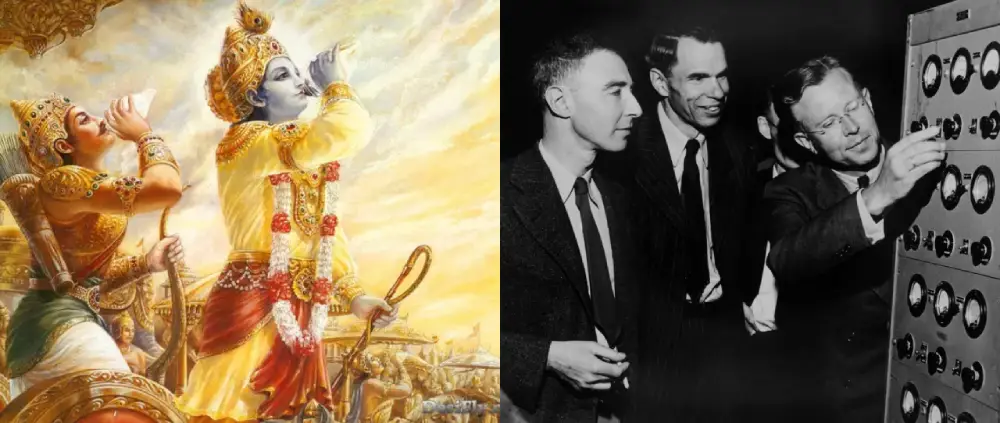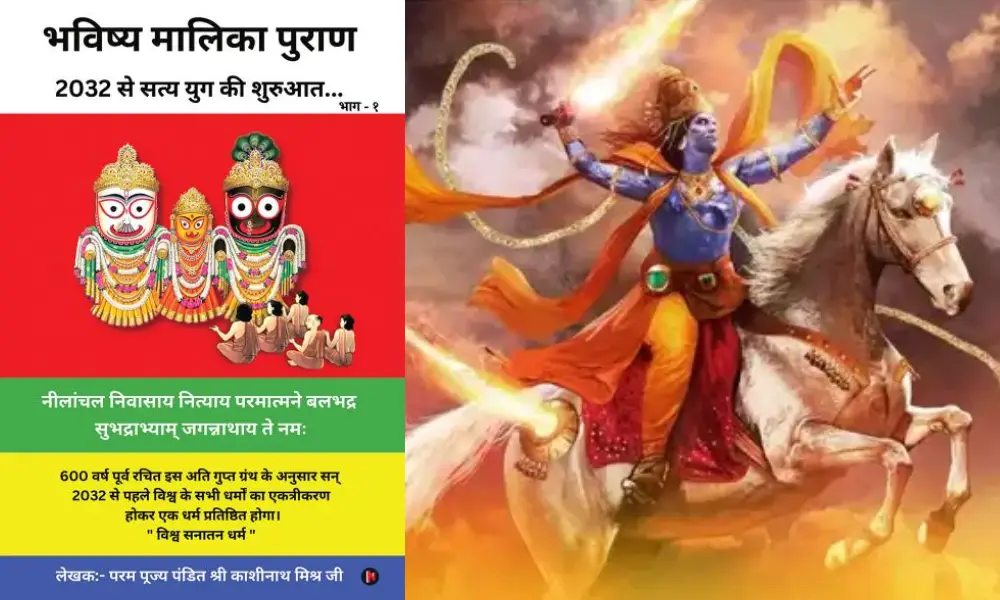The infamous quote attributed to J. Robert Oppenheimer, "Now I am become Death, the destroyer of worlds," comes from a Hindu scripture called the Bhagavad Gita.
Oppenheimer was the scientific director of the Manhattan Project, which developed the first atomic bombs during World War II. After the successful test of the first atomic bomb on July 16, 1945, Oppenheimer reportedly thought of this quote from the Bhagavad Gita, which describes the god Vishnu taking on a terrifying form to destroy evil forces.
In a 1965 interview, Oppenheimer described the moment of the test as follows:
"We knew the world would not be the same. A few people laughed, and a few people cried. Most people were silent. I remembered the line from the Hindu scripture, the Bhagavad Gita; Vishnu is trying to persuade the Prince that he should do his duty and, to impress him, takes on his multi-armed form and says, 'Now I am become Death, the destroyer of worlds.' I suppose we all thought that, one way or another."
Oppenheimer's quote has been interpreted in different ways over the years, with some viewing it as a reflection of the moral and ethical implications of nuclear weapons, and others seeing it as a demonstration of the immense power of science and technology. Regardless of its interpretation, the quote remains a powerful reminder of the consequences of scientific advancement and the responsibility that comes with it.
J. Robert Oppenheimer
J. Robert Oppenheimer, who served as the head of the Los Alamos Laboratory during World War II and is widely considered the "father" of the atomic bomb, passed away on February 18, 1967, at the age of sixty-two in Princeton, New Jersey. Reflecting on the Trinity nuclear test, he famously remarked, "We knew the world would not be the same. A few people laughed, a few people cried, and most people were silent." Following this event, Oppenheimer turned to Hinduism, which he found to be a useful philosophy to guide his life, although he never adopted it as a devotional practice. Rev Dr. Stephen Thompson, a Ph.D. holder in Sanskrit grammar and a current DPhil student at Oxford University, notes that Oppenheimer's interest in Hinduism went beyond a mere fascination and instead provided him with a framework to comprehend his actions.
The Bhagavad-Gita is a Sanskrit scripture comprising 700 verses that revolves around a conversation between Arjuna, a prominent warrior prince, and Lord Krishna, an incarnation of Vishnu and Arjuna's charioteer. Arjuna faces a dilemma as he prepares to battle an opposing army, which includes his friends and relatives. In response, Krishna imparts to him a higher philosophy that allows him to fulfill his duty as a warrior without being swayed by personal emotions. This philosophy is known as dharma, or holy duty, and is one of the Bhagavad-Gita's four main teachings, which include desire or lust, wealth, the yearning for righteousness or dharma, and the ultimate state of liberation, or moksha.
In July 1945, Oppenheimer was reminded of a moment in the Bhagavad-Gita when Lord Krishna reveals his universal form to the warrior prince Arjuna. In verse twelve of the Gita, Krishna appears as a sublime and terrifying being with many mouths and eyes, and it was this image that came to Oppenheimer's mind when he witnessed the detonation of the atomic bomb in the desert of New Mexico. His translation of the moment was, "If the radiance of a thousand suns were to burst at once into the sky, that would be like the splendor of the mighty one."
In Hinduism, time is seen as non-linear and the great god is believed to be involved not only in creation but also in dissolution. In verse thirty-two of the Bhagavad-Gita, Lord Krishna speaks the line that became famous due to Oppenheimer's use of it: "Now I am become death, the destroyer of worlds." According to Rev Dr. Stephen Thompson, this line actually refers to "world-destroying time," which is a concept in Hinduism that means everything is ultimately in the hands of the divine, regardless of what actions are taken by individuals like Arjuna. Oppenheimer's Sanskrit teacher chose to translate "world-destroying time" as "death," which is a common interpretation.
According to Rev Dr. Stephen Thompson, Oppenheimer's interest in Hinduism was not just a soundbite, but a way of making sense of his actions as the wartime head of the Los Alamos Laboratory. The Bhagavad-Gita teaches about the higher philosophy of dharma or holy duty, which enables one to carry out their duties irrespective of personal concerns. Arjuna, a warrior, is taught by Krishna to be sublimely unattached to the results of his actions, as everything is ultimately in the hands of the divine. However, Oppenheimer seemed to struggle with achieving this peace and is famously quoted as saying, "The physicists have known sin," suggesting a deep sense of guilt or remorse for his role in creating the atomic bomb.
Thompson suggests that Oppenheimer did not share the same belief as Arjuna regarding the eternal nature of the soul. In the Gita, the fourth argument is that death is an illusion and that there is only one consciousness in the whole of creation. However, it can be inferred that Oppenheimer did not believe that the victims of the bombings in Hiroshima and Nagasaki would be free from suffering. Although he carried out his duties, he could not reconcile his actions with the idea of liberation from the cycle of life and death. In contrast, Arjuna comes to understand his mistake and decides to participate in the battle.
Krishna's message to Arjuna is that as a warrior, his duty is to fight, regardless of the consequences. This is similar to how the use of the atomic bomb could be seen as a necessary evil in the fight against fascism and the forces of evil. However, this duty only applies to Arjuna as a warrior and not as a priest or other profession.
While Arjuna could remain indifferent to war because he believed in the eternal nature of the soul, Oppenheimer was deeply affected by the consequences of the atomic bomb. According to Thompson, Oppenheimer lacked the confidence that destruction was merely an illusion, unlike Arjuna. Oppenheimer's inability to embrace the concept of an immortal soul seemed to have a lasting impact on him.





